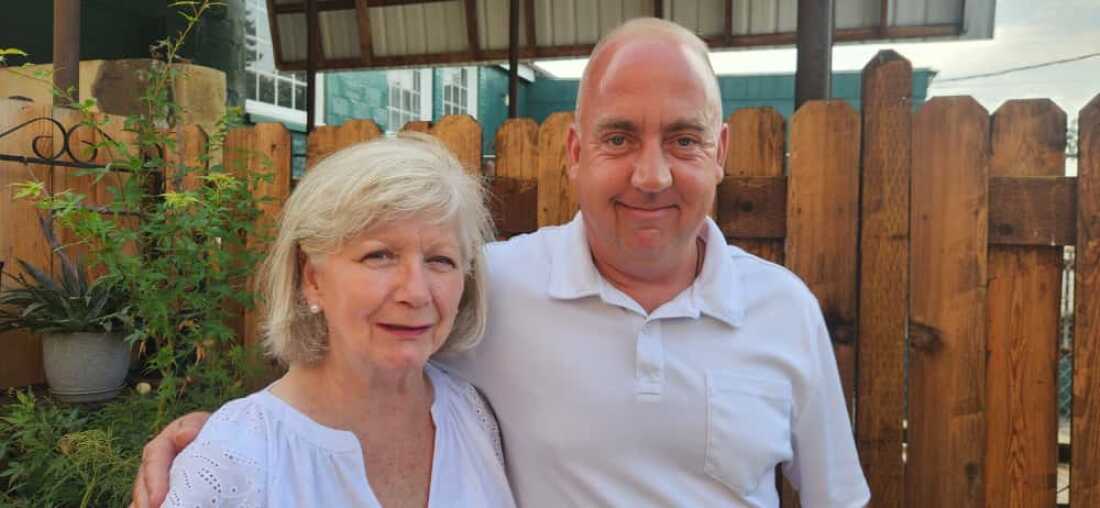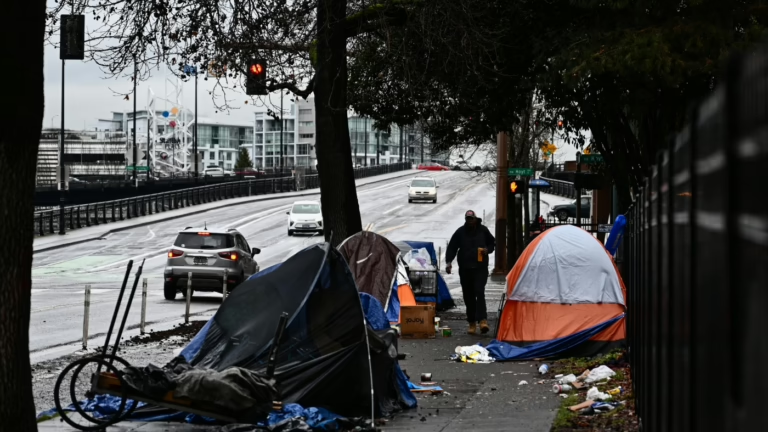A passerby moves along a Portland, Oregon sidewalk lined with tents on January 24, 2024. President Trump has vowed to clear homeless populations from urban areas by mandating many be placed in “long-term institutional settings.” This plan has raised concerns among homelessness and civil rights experts.
Patrick T. Fallon/AFP via Getty Images
toggle caption
Patrick T. Fallon/AFP via Getty Images
PORTLAND, Oregon – On a bright late summer day, Logan Whalen stood outside his downtown Portland barbershop. Nearby, two homeless individuals sheltered in a doorway were visibly using illicit substances. Whalen noted that drug transactions occasionally occur openly on his street. “It’s exhausting. Mostly it’s just a disturbance, but sometimes it feels threatening,” he shared.
Contrary to President Trump’s recent depiction of Portland as a “war zone” warranting National Guard intervention, the city remains vibrant with upscale eateries, boutiques, and a bustling business district filled with residents and visitors alike.
Despite ongoing efforts by city officials, homelessness persists on many streets, often intertwined with severe addiction and mental health challenges. Whalen recounted a recent incident where a homeless person exhaled fentanyl smoke directly at him.

Logan Whalen, owner of a Portland barbershop, expresses growing “compassion fatigue” over the city’s homelessness crisis. While concerned about Trump’s national crackdown aimed at removing street dwellers, he questions, “Where will they be placed – jail? We need to stop cutting mental health funding,” he told NPR.
Brian Mann/NPR
toggle caption
Brian Mann/NPR
“I’m a liberal Democrat and openly gay, but the exhaustion from constant exposure to homelessness is real,” Whalen admitted. “I want to walk on the sidewalk, not dodge people living on the streets.”
In response to rising public concern about homelessness, President Trump advocates for expanding civil commitment laws, allowing courts to mandate treatment for addiction and mental illness more frequently.
“Our once-great cities have deteriorated into unlivable, unsanitary conditions, overtaken by the homeless, addicts, and dangerously unstable individuals,” Trump declared in an April 2023 campaign video. “Those severely mentally ill will be returned to mental health institutions, where they belong.”
 law enforcement officers at the U.S. Park Police’s Anacostia Operations Facility in Washington, D.C., on August 21, 2025.” loading=”lazy” />
law enforcement officers at the U.S. Park Police’s Anacostia Operations Facility in Washington, D.C., on August 21, 2025.” loading=”lazy” />
President Trump speaks to law enforcement at the U.S. Park Police’s Anacostia Operations Facility in Washington, D.C., on August 21. His administration deployed federal officers and the National Guard to assist local police and enhance crime prevention in the capital.
Anna Moneymaker/Getty Images
toggle caption
Anna Moneymaker/Getty Images
In July, Trump issued an executive order encouraging state and local governments to increase the use of civil commitment, aiming to place more homeless individuals into long-term care facilities. “Transitioning homeless people into humane, long-term institutional treatment through civil commitment will help restore public order,” he stated.
Bipartisan support grows for expanding civil commitment
As homelessness worsens nationwide, Trump’s stance is echoed by some Democrats who also support broader use of civil commitment laws.
Nearly every state has civil commitment statutes, typically reserved for rare situations where individuals pose immediate danger to themselves or others. Courts may order outpatient treatment or short-term hospitalization in these cases.
Democratic-led states like California, New York, and Oregon have recently broadened civil commitment criteria. Massachusetts, another blue state, already has one of the highest rates of involuntary commitments for substance use disorders in the country.
Oregon State Representative Jason Kropf, who authored the state’s updated law, explained his motivation: “I wanted to find a balance between helping those in crisis who can’t help themselves and avoiding overuse of institutionalization.”
Judy Thompson, a longtime mental health advocate in Oregon, supported the new legislation after witnessing her son’s bipolar schizoaffective disorder spiral out of control in 2019, culminating in a serious car accident.

Alton Aanderud, 53, has lived with bipolar schizoaffective disorder for decades. His mother, Judy Thompson, 73, has petitioned courts to hospitalize him under Oregon’s civil commitment law. Both acknowledge the necessity of such interventions but stress they should be rare. “Civil commitment is frightening because you don’t know what to expect,” Aanderud told NPR.
Brian Mann/NPR
toggle caption
Brian Mann/NPR
Though no fatalities occurred, Thompson said her son’s behavior endangered others and led to a criminal record before a judge finally ordered his hospitalization. “We need legal flexibility so judges can intervene before situations become catastrophic,” she said.
Aanderud agreed that civil commitment was crucial in securing the treatment he needed but described hospitalization as disruptive and disorienting.
“It’s not about locking everyone up,” he said. “When I left Oregon State Hospital, I had nothing-no home, one pair of pants, one shirt. It’s discouraging to feel like you’re starting over.”
With his mother’s support, Aanderud now lives independently, but he recognizes many homeless individuals lack such a safety net.
“Civil commitment is intimidating because you don’t know what you’re getting into. They stabilize you, then you’re left to fend for yourself,” he explained.
Experts interviewed by NPR largely agree that civil commitment should remain a last resort. Many expressed concern over Trump’s emphasis on forced treatment to “restore public order,” fearing it could lead to prolonged institutionalization.
“We must avoid treating these individuals as nuisances to be hidden away,” said Dr. Kenneth Minkoff, a psychiatrist and authority on mandated healthcare. “That approach is unacceptable.”
Most specialists advocate for less intrusive solutions, such as affordable healthcare and housing assistance, to support homeless populations.
“Using forced institutionalization is like wielding a sledgehammer-it’s costly and infringes on civil liberties,” said Morgan Godvin, a former heroin addict and drug policy researcher who experienced homelessness in Portland. “Why resort to the most extreme option?”
Funding challenges loom over expanded institutionalization

During Trump’s August crackdown in Washington, D.C., dozens of tent encampments like this one were cleared. Trump envisions the D.C. operation as a blueprint for other cities, though homelessness experts warn many street dwellers have nowhere else to go.
Brian Mann/NPR
toggle caption
Brian Mann/NPR
A critical question remains unanswered: who will finance the expansion of civil commitment and long-term institutional care? The U.S. lacks sufficient residential facilities and qualified healthcare workers to serve even a fraction of the estimated 270,000 people experiencing homelessness nationwide.
Meanwhile, Congressional Republicans have cut approximately $900 billion from Medicaid, the primary funding source for addiction and mental health services in America.

Officials from the Trump administration argue that taxpayer funds have been squandered on “woke” liberal approaches to homelessness, such as “housing first” initiatives and harm reduction programs for addiction. The executive order calls for reallocating some of these resources.
“We believe this can be addressed without additional spending,” a senior White House official said anonymously. “It’s about accountability and ensuring federal funds are used effectively.”
However, Oregon’s Rep. Kropf disagrees, noting that his state has already allocated $65 million to develop new residential facilities to support individuals who may be compelled into treatment under the revised civil commitment law.
“The key question is whether we have the capacity to implement these new standards and provide necessary services,” Kropf emphasized.
Dr. Minkoff highlighted that treating homeless individuals with severe addiction and mental illness is inherently expensive. Many require ongoing support after stabilization to avoid returning to homelessness.
“We already need more resources,” he said. “Even when improved, these individuals remain vulnerable and require sustained supportive housing, which is currently insufficient.”
Judy Thompson, who advocated for Oregon’s updated civil commitment law, expressed caution about Trump’s executive order. She praised Oregon’s carefully crafted legislation, which limits hospitalization duration, but fears other states might adopt broader policies aimed at simply removing homeless people from public view.
“It’s like discarding trash-treating people as worthless,” she warned. “Civil commitment can be a tool for good or harm.”
Both proponents and opponents of expanded civil commitment agree that the impact will depend heavily on the specific details of each state’s laws. The White House official expressed confidence that Trump’s order will be implemented in ways that help more people exit homelessness while safeguarding their rights.
























